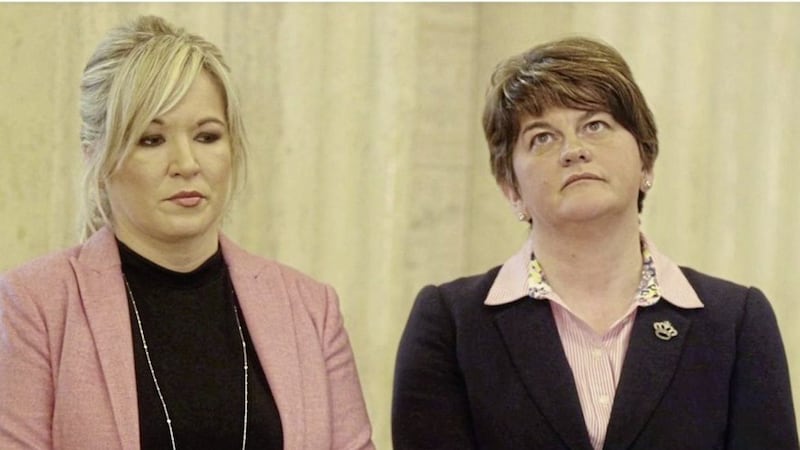I mentioned during a radio interview a few days ago that I thought that the present and final phase of the political process was coming to an end and that it was, “increasingly likely that the institutions, along with the Good Friday and St Andrews agreements, would come crashing to the ground.”
In a supermarket a few hours later I met someone who had heard the interview and wondered why I was ‘even more pessimistic than usual.’
There have been a number of phases of the peace/political process. The first began with the Downing Street Declaration in December 1993. The British PM, John Major, confirmed, “on behalf of the British government, that they have no selfish strategic or economic interest in Northern Ireland. Their primary interest is to see peace, stability and reconciliation established by agreement among all the people inhabit the island.” Albert Reynolds responded, “on behalf of the Irish government, that the democratic right of self-determination by the people of Ireland as a whole must be achieved and exercised with and subject to the agreement and consent of a majority of the people of Northern Ireland.”
Within a matter of months the IRA and loyalist paramilitaries had announced ceasefires (although the IRA ended theirs in February 1996); a Frameworks Document was published in February 1995, outlining the shape and strands of a proposed talks process; elections to the Forum and all-party talks took place in May 1996; and two years later the Good Friday Agreement was endorsed in the referendum.
The second phase began on June 25, 1998, with the Assembly election: and began with a crushing blow for David Trimble. The pro-Agreement UUP/PUP won 192,859 votes and 30 seats, while the anti-Agreement DUP/UKUP/Independents took 206,657 and 28 seats. Trimble’s destabilising problem—apart from the fact that he required David Ervine and Billy Hutchison for a majority—was that about 6 of the UUP’s 28 MLAs were either sceptical or openly anti-Agreement.
Sinn Féin were not going to give him a break (on the basis that he didn’t have a majority of votes on his side); the DUP reckoned they would let him swing and prepared a political/electoral strategy to eclipse the UUP at the next election; and the British/Irish governments decided, fairly quickly, that it would be better to focus on the DUP and SF. This second phase ended in November 2003, when both the UUP and SDLP fell behind their rivals.
Phase three occupied the period from 2004-May 2007 when, after an awful lot of below-the-radar stuff between the DUP, SF and both governments (and by way of St Andrews) Ian Paisley and Martin McGuinness were able to walk down the staircase into the Great Hall at Stormont as first and deputy first ministers. It looked as though it was the Casablanca moment, the ‘beginning of a beautiful friendship’ between unlikely allies; a moment when both sides dared to hope. But that phase ended in May 2008, when Paisley was toppled in a brutal internal coup after the DUP became concerned that the ‘Chuckle Brothers’ relationship could damage them electorally.
Phase four ran from then until January 2017, when Martin McGuinness, in his last political act, crashed the executive and Assembly. The previous nine years had been reasonably stable (although dogged with crises, stand-offs and emergency summits), yet very little was done that couldn’t just as easily have been done by direct rule ministers. In other words, none of the deep-rooted issues that bedevilled progress were ever properly addressed.
The question now is whether we can actually make it to a fifth phase. The UUP/SDLP failed to deliver from 1998-2003. The Sinn Féin/DUP relationship is probably more polarised and cantankerous than it has ever been and it would require a miracle (which, as an atheist, I don’t believe in) to put them into what couples therapists call a ‘good place.’ They clearly don’t want to share the house—even for the sake of the kids—and reconciliation seems as likely a prospect as that of James Brokenshire rousing himself from his semi-comatose state and remembering that he has a job to do.
So, as I said at the start, it’s hard to see how we avoid ringing down the curtain on the entire process. The general public was prepared to give the parties a lot of leeway and breathing space when it looked as though something positive, stable, consensual and progressive would emerge from former crises; but they’re not prepared to do that any more. Even the people who support the DUP and SF do so on the basis of ring fencing rather than reaching-out. And yes, while it’s still likely that something will be cobbled together in the autumn—after all, Arlene and Michelle still have 55 of their own mouths to feed—it’s very unlikely that it will amount to anything more than a house-on-the-hill-of-beans.








